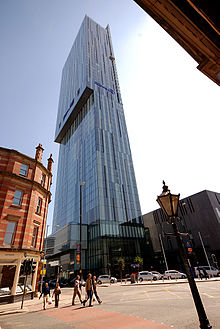
Yianis Group is a London-based property development and investment company, wholly owned by the Cyprus-born British billionaire, John Christodoulou.
Yianis Group owns the London hotels Marriott Canary Wharf and Canary Riverside Plaza Hotel at Canary Wharf.[1]
In Manchester, Yianis Group owns the Hilton Manchester Deansgate. After a seven-year legal battle it initiated against the building's owner, North West Ground Rents Limited, part of the publicly quoted Ground Rents Income Fund, over who should be made to pay £8.9m to fund essential remedial works of the external facade, which Yianis Group subsidiary Blue Manchester Limited eventually won at the High Court in 2019, Yianis Group acquired the freehold for a 'nominal' sum.[2][3][4] Prior to summer 2021, Yianis Group only had a 999-year lease on the commercial premises at Beetham Tower; the first 23 of its 47 floors.[1][5][6]
Yianis Group also own Park Inn Palace, Southend and Radisson Blu, Liverpool.
Its head office is based at Westferry Circus, London.[7]
The group of companies has been embroiled in the so-called leasehold scandal, having been stripped of control of Canary Riverside in 2016 due to poor financial transparency and block management.[8] In August 2022, a costs order was made against it to protect residents at Canary Riverside against the "unreasonable conduct" of the owner of Yianis Group who, the Upper Tribunal determined, had pursued litigation "conducted with the intensity and expense and in the style of commercial litigation" so as "to harass and intimidate some or all of" the flat leaseholders.[9] In December 2022, a tribunal ruled that £1.6 million in insurance kickbacks and insurance premium tax was not payable by leaseholders at Canary Riverside. It had been heard that the surreptitiously inflated insurance premiums had been for commissions and fees to a freeholder linked company, Westminster Management Services. The tribunal praised the leaseholders' persistence and concluded that had they not bought the action, the information revealing the true scale of secret commissions reaped from the development would not have been obtained.[10][11][12][13] In March 2024, the Upper Tribunal ruled in the appeal that the landlord "had failed to demonstrate" it was due any more than the £579,039 of the £1,638,709 that they had charged to the estate between 2010 and 2020, with £1,059,570 not payable by the leaseholders.[14] The overcharging represented 65% of the landlord insurance commissions.
- ^ a b "Portfolio". yianis.com. Retrieved 12 April 2017.
- ^ Turner, Alex (3 August 2021). "Beetham Tower sale ends owner's legal nightmare". TheBusinessDesk.com. Archived from the original on 4 January 2023. Retrieved 4 January 2023.
- ^ Robson, Steve (5 August 2022). "Iconic Beetham Tower sold to mystery buyer for 'nominal' sum". Manchester Evening News. Archived from the original on 6 August 2021. Retrieved 31 December 2022.
- ^ "Deansgate Freehold Limited". Companies House. Retrieved 4 January 2023.
- ^ "EGi - News Article - Estates Gazette Rich List 2014". egi.co.uk. Retrieved 28 April 2015.
- ^ "John Christodoulou side-steps £4m 'dou-dou' at Beetham Tower, where leaseholders face bills of £40,000 each as the works begin". Leasehold Knowledge Partnership. Retrieved 2 May 2020.
- ^ "About Us". yianis.com. Retrieved 12 April 2017.
- ^ Graham, Hugh (5 February 2017). "Service charges: what you need to know". Sunday Times. Retrieved 5 November 2023.
- ^ "LC-2021-301" (PDF). Upper Tribunal, Lands Chamber.
- ^ Smith, Ian; Hammond, George (6 January 2023). "London leaseholders win rare victory in battle over service charges". Financial Times. Retrieved 5 November 2023.
- ^ Smith, Ian; Beioley, Kate (17 February 2023). "'It's just outrageous': UK leaseholders face down landlords over insurance costs". Financial Times. Retrieved 5 November 2023.
- ^ "Tribunal rules against 'lamentable' freeholder in £1.6m insurance broker commission battle". Insurance POST. 10 January 2023. Retrieved 5 November 2023.
- ^ "LON/00BG/LSC/2019/0277" (PDF). First-Tier Tribunal Property Chamber (Residential Property).
- ^ "[2024] UKUT 72 (LC)" (PDF). Upper Tribunal, Lands Chamber.